
The Simple Girl is a 1957 West German musical comedy film directed by Werner Jacobs and produced by Artur Brauner. It starred Caterina Valente, Rudolf Prack and Ruth Stephan.
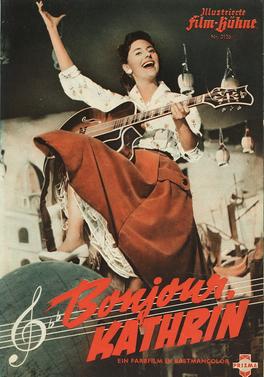
Bonjour Kathrin is a 1956 West German musical film directed by Karl Anton and starring Caterina Valente, Peter Alexander and Silvio Francesco. It is based on the operetta Die glücklichste Frau der Welt by Max Wallner and Kurt Feltz. It was shot in Eastmancolor at the Wiesbaden Studios in Hesse. The film's sets were designed by the art directors Andrej Andrejew and Helmut Nentwig.

Bashful Felix or Felix is Right on Target is a 1934 German comedy film directed by Carl Boese and starring Rudolf Platte, Ursula Grabley, and Jakob Tiedtke. It was made by Terra Film, with sets designed by art directors Robert A. Dietrich and Bruno Lutz.
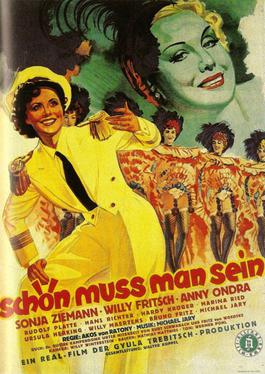
You Have to Be Beautiful is a 1951 German musical comedy film directed by Ákos Ráthonyi and starring Sonja Ziemann, Willy Fritsch and Anny Ondra. The film's sets were designed by art director Mathias Matthies. It was Ondra's final film apart from a brief cameo role in The Affairs of Julie.

The Monastery's Hunter is a 1953 West German historical drama film directed by Harald Reinl and starring Erich Auer, Marianne Koch and Paul Hartmann. It is based on the 1892 novel of the same title by Ludwig Ganghofer which had previously been made into a 1920 silent film and a 1935 sound film.

Three Days of Fear is a 1952 West German comedy crime film directed by Erich Waschneck and starring Rudolf Platte, Camilla Spira and Cornelia Froboess. It was shot at the Göttingen Studios. The film's sets were designed by Hans Jürgen Kiebach and Gabriel Pellon.

My Sister and I is a 1954 West German musical film directed by Paul Martin and starring Sonja Ziemann, Adrian Hoven and Herta Staal. It is based on the 1930 stage work of the same name.

We'll Talk About Love Later is a 1953 West German comedy film directed by Karl Anton and starring Gustav Fröhlich, Maria Holst and Liselotte Pulver.
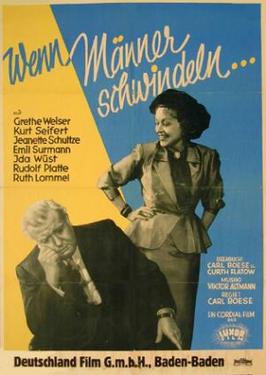
When Men Cheat is a 1950 West German comedy film directed by Carl Boese and starring Grethe Weiser, Kurt Seifert and Jeanette Schultze. It was made at the Tempelhof Studios in Berlin. The film's sets were designed by the art directors Willi Herrmann and Heinrich Weidemann.
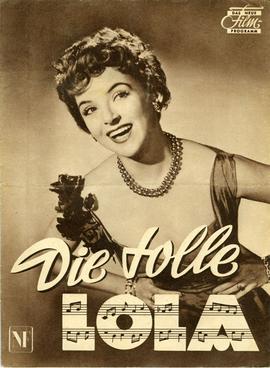
The Great Lola is a 1954 West German comedy film directed by Hans Deppe and starring Herta Staal, Wolf Albach-Retty and Grethe Weiser. The film's sets were designed by the art directors Willi Herrmann and Heinrich Weidemann.

The Indiscreet Woman is a 1927 German silent comedy film directed by Carl Boese and starring Jenny Jugo, Maria Paudler and Georg Alexander.

How Shall I Tell My Husband? is a 1932 German comedy film directed by Reinhold Schünzel and starring Renate Müller, Georg Alexander, and Ida Wüst. It was shot at the Babelsberg and Tempelhof Studios in Berlin. The film's sets were designed by the art director Werner Schlichting. Location filming took place at Heringsdorf on the Baltic Sea. It premiered at the Gloria-Palast in Berlin.
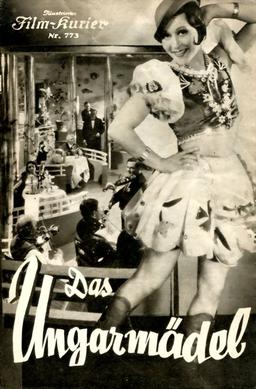
Gypsy Blood is a 1934 German comedy film directed by Charles Klein and starring Adele Sandrock, Georg Alexander, and Erik Ode. It was released by the German subsidiary of Universal Pictures. In Austria it was known by the title Das Ungarmädel.

A Drive into the Blue is a 1919 German silent comedy film directed by Rudolf Biebrach and starring Henny Porten, Georg Alexander, and Jakob Tiedtke.

My Daughter Doesn't Do That is a 1940 German romantic comedy film directed by Hans H. Zerlett and starring Ralph Arthur Roberts, Erika von Thellmann, and Geraldine Katt.

Ball at the Savoy is a 1955 West German musical comedy film directed by Paul Martin and starring Rudolf Prack, Nadja Tiller, and Peter W. Staub. Inspired by the 1932 operetta Ball im Savoy by Paul Abraham, this film is closer to a revue show than the previous 1935 film adaptation.

The Big Star Parade is a 1954 West German musical comedy film directed by Paul Martin and starring Adrian Hoven, Renate Holm and Gunther Philipp.

The Angel Who Pawned Her Harp is a 1959 West German fantasy comedy film directed by Kurt Hoffmann and starring Nana Osten, Henry Vahl and Ullrich Haupt. It was shot at the Bavaria Studios in Munich. The film is based on the novel of the same title by Charles Terrot which had previously been made into a British film in 1954.

Mamitschka is a 1955 West German comedy-drama film directed by Rolf Thiele and starring Mila Kopp, Rudolf Platte and Jester Naefe.
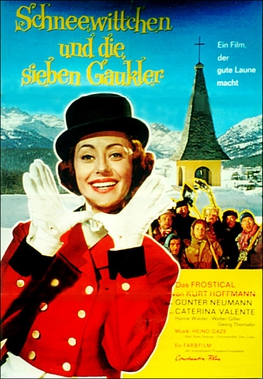
Snow White and the Seven Jugglers is a 1962 Swiss-West German musical comedy film directed by Kurt Hoffmann and starring Caterina Valente, Walter Giller and Georg Thomalla.




















